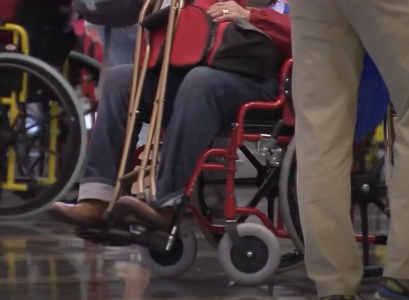What paused enforcement means for travelers who use wheelchairs
By
Veronica E.
- Replies 0
For travelers who rely on wheelchairs, recent headlines brought both hope and concern.
The Biden administration had announced a sweeping set of protections designed to make flying safer and more dignified for passengers using mobility devices.
These rules promised stronger accountability for airlines, better compensation for mishandled wheelchairs, and clearer communication of passenger rights.
But now, the US Department of Transportation (USDOT) has decided not to enforce the most significant parts of that rule.
This decision has left disability advocates, travelers, and their families questioning what comes next.

A promise paused before takeoff
Back in December, the former administration introduced new requirements to hold airlines accountable for wheelchair mishandling and to reimburse passengers who had to pay more for flights due to wheelchair size limitations.
The intent was clear—make air travel less risky and less stressful for those who depend on mobility devices.
But after major carriers including United, Delta, American, Southwest, and JetBlue challenged the regulations in court, USDOT announced it would pause enforcement.
Officials say they are revisiting the rule and drafting new language, leaving the original protections on hold for now.
Also read: Don’t book your next flight until you read these senior travel must-knows
What is not being enforced
The pause affects several key provisions:
Also read: Big airlines are fighting a new rule that could change everything for travelers with mobility devices—are your flights affected?
Why this matters
USDOT estimates about 5.5 million Americans rely on wheelchairs.
On average, at least one wheelchair or scooter out of every 100 loaded onto a domestic flight is damaged, delayed, or lost.
For those affected, this can mean far more than an inconvenience—it can upend an entire trip, prevent someone from attending an important family event, or create lasting physical hardship.
The issue is not theoretical.
In October 2024, American Airlines faced a record $50 million fine for failing to provide adequate disability assistance and mishandling mobility devices.
The scale of the penalty underscored how widespread the problem remains.
Also read: Passenger’s mid-flight stomach emergency forces messy plane scene
What airlines are saying
Airlines for America, the industry’s main trade association, argues that progress is being made.
The group points to a 2022 commitment by major carriers to improve accessibility and says work is underway to make air travel more inclusive.
Still, with the most meaningful enforcement measures on hold, travelers and advocates remain skeptical.
Also read: Think twice before wearing shorts on a plane—flight attendants explain why
What’s next
USDOT has emphasized that it will continue enforcing other parts of the rule and remains committed to supporting travelers with disabilities.
However, officials are also reviewing whether the paused provisions are legally necessary or duplicative of existing protections.
At the same time, the department has stepped back from other consumer-focused proposals, such as requiring cash compensation for flight delays caused by airlines.
Critics argue that these reversals weaken consumer confidence and leave vulnerable passengers without essential safeguards.
Also read: The sneaky flight trick an airline is banning—travelers, take note!
What travelers can do now
If you or someone you know uses a wheelchair and plans to fly soon, there are still steps you can take:
Travel should be safe, accessible, and fair for every passenger, no matter their needs.
While these rule changes leave many questions unanswered, staying informed and speaking up can help shape what comes nex
Read next:

Have you or someone you know had a wheelchair damaged, delayed, or lost by an airline? Do you believe the government should step in more forcefully to protect disabled travelers? Or have you noticed real improvements in accessibility in recent years?
Share your stories, tips, and perspectives in the comments—the GrayVine community can benefit from your experiences.
The Biden administration had announced a sweeping set of protections designed to make flying safer and more dignified for passengers using mobility devices.
These rules promised stronger accountability for airlines, better compensation for mishandled wheelchairs, and clearer communication of passenger rights.
But now, the US Department of Transportation (USDOT) has decided not to enforce the most significant parts of that rule.
This decision has left disability advocates, travelers, and their families questioning what comes next.

Recent changes have raised concerns about protections for air travelers who use wheelchairs. Image Source: YouTube / KVUE.
A promise paused before takeoff
Back in December, the former administration introduced new requirements to hold airlines accountable for wheelchair mishandling and to reimburse passengers who had to pay more for flights due to wheelchair size limitations.
The intent was clear—make air travel less risky and less stressful for those who depend on mobility devices.
But after major carriers including United, Delta, American, Southwest, and JetBlue challenged the regulations in court, USDOT announced it would pause enforcement.
Officials say they are revisiting the rule and drafting new language, leaving the original protections on hold for now.
Also read: Don’t book your next flight until you read these senior travel must-knows
What is not being enforced
The pause affects several key provisions:
- Airline liability for mishandled wheelchairs: No new penalties or stricter standards will apply if a wheelchair is damaged, delayed, or lost.
- Fare reimbursement: Airlines are not currently required to cover extra costs if a traveler has to book a different flight because their wheelchair doesn’t fit on a plane.
- Written notice of rights: Airlines do not have to provide printed information about wheelchair-related rights when passengers check a mobility device.
Why this matters
USDOT estimates about 5.5 million Americans rely on wheelchairs.
On average, at least one wheelchair or scooter out of every 100 loaded onto a domestic flight is damaged, delayed, or lost.
For those affected, this can mean far more than an inconvenience—it can upend an entire trip, prevent someone from attending an important family event, or create lasting physical hardship.
The issue is not theoretical.
In October 2024, American Airlines faced a record $50 million fine for failing to provide adequate disability assistance and mishandling mobility devices.
The scale of the penalty underscored how widespread the problem remains.
Also read: Passenger’s mid-flight stomach emergency forces messy plane scene
What airlines are saying
Airlines for America, the industry’s main trade association, argues that progress is being made.
The group points to a 2022 commitment by major carriers to improve accessibility and says work is underway to make air travel more inclusive.
Still, with the most meaningful enforcement measures on hold, travelers and advocates remain skeptical.
Also read: Think twice before wearing shorts on a plane—flight attendants explain why
What’s next
USDOT has emphasized that it will continue enforcing other parts of the rule and remains committed to supporting travelers with disabilities.
However, officials are also reviewing whether the paused provisions are legally necessary or duplicative of existing protections.
At the same time, the department has stepped back from other consumer-focused proposals, such as requiring cash compensation for flight delays caused by airlines.
Critics argue that these reversals weaken consumer confidence and leave vulnerable passengers without essential safeguards.
Also read: The sneaky flight trick an airline is banning—travelers, take note!
What travelers can do now
If you or someone you know uses a wheelchair and plans to fly soon, there are still steps you can take:
- Plan ahead: Contact your airline before your trip to confirm wheelchair policies and request written confirmation when possible.
- Document everything: Take photos of your wheelchair prior to check-in and keep receipts for any related expenses.
- Know your rights: Under the Air Carrier Access Act, airlines must still provide basic assistance and cannot discriminate against passengers with disabilities.
- Speak up: If your wheelchair is mishandled or you face accessibility issues, file a complaint with both the airline and USDOT. Each report helps build pressure for stronger protections.
Travel should be safe, accessible, and fair for every passenger, no matter their needs.
While these rule changes leave many questions unanswered, staying informed and speaking up can help shape what comes nex
Read next:
- The best seats to avoid motion sickness, according to flight attendants
- Best budget airlines in America ranked—top pick offers flights from just $38
- Grandma’s quick action helps avert disaster mid-flight
Key Takeaways
- USDOT has paused enforcement of new rules that would have given wheelchair users stronger protections, including compensation for mishandled devices and fare reimbursement.
- Major US airlines challenged the regulations, leading the department to review and rewrite parts of the rule.
- At least one in every 100 wheelchairs or scooters loaded onto domestic flights is reported as damaged, delayed, or lost.
- While airlines claim they are making progress on accessibility, advocates argue that protections remain insufficient without enforcement.
Have you or someone you know had a wheelchair damaged, delayed, or lost by an airline? Do you believe the government should step in more forcefully to protect disabled travelers? Or have you noticed real improvements in accessibility in recent years?
Share your stories, tips, and perspectives in the comments—the GrayVine community can benefit from your experiences.






